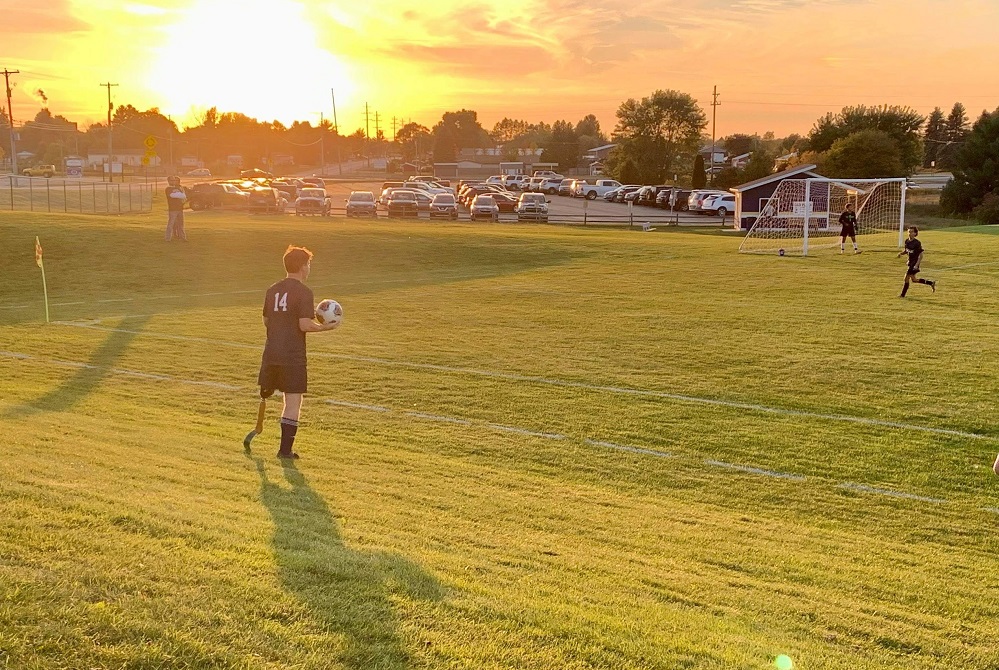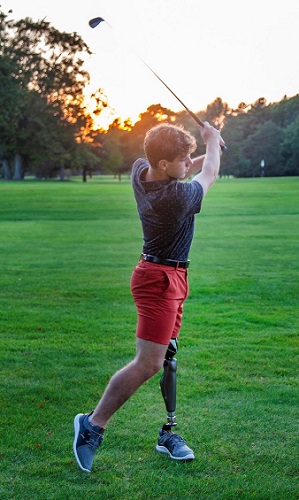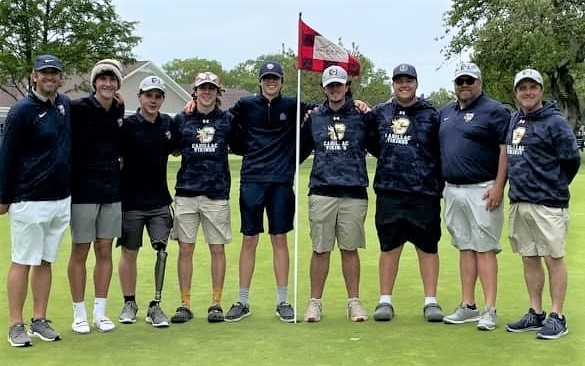
MHSA(Q&)A: Soccer Coaches President Zach Jonker
September 21, 2012
By Geoff Kimmerly
Second Half editor
Zach Jonker has had his hands – or, perhaps, feet – on just about every facet of soccer in this state over the last 20 years.
 He played on a Class B Semifinalist at Petoskey before graduating in 1995, then earned four letters and served as a captain at Hope College. He came back home to teach social studies and became coach of both boys and girls varsities that are regularly among the northern Lower Peninsula's elite, but also are highly-regarded statewide. And this fall, he began the first of a two-year term as president of the Michigan High School Soccer Coaches Association.
He played on a Class B Semifinalist at Petoskey before graduating in 1995, then earned four letters and served as a captain at Hope College. He came back home to teach social studies and became coach of both boys and girls varsities that are regularly among the northern Lower Peninsula's elite, but also are highly-regarded statewide. And this fall, he began the first of a two-year term as president of the Michigan High School Soccer Coaches Association.
So he can speak first-hand on the benefits of playing high school soccer in Michigan, which is good news to get out perhaps now more than ever. Michigan high school soccer is facing a predicament unlike any it has tackled before – the creation by U.S. Soccer of its Development Academy, a set of travel teams all over the country that train nearly year-round and are meant to eventually fuel the men's national team. That opportunity has drawn a number of top Michigan players out of high school soccer.
Jonker and his coaching brethren are monitoring that situation closely, while continuing to lead their teams into the second half of this fall boys season. His Northmen are 6-7-1 overall this fall, but have faced three of the top-five ranked teams in Division 1 and another from Division 2.
Despite your location near the tip of the Lower Peninsula, you still manage to schedule strong competition. How do you make it work?
We’re in a really nice spot. Traverse City hosts a tournament during the regular season with Traverse City Central, Traverse City West and Petoskey, and then they invite three schools from downstate that have generally been (Warren) DeLaSalle, Clarkston and Ann Arbor Skyline. The following weekend, we host a similar format with Rochester Hills Stoney Creek and Bloomfield Hills Lahser. We get six really good games at the start of the season with two tournaments. It’s early in the season and teams love coming up, making a weekend out of it, hitting the beach and doing some bonding. And the fields at Traverse City and Petoskey are both beautiful, which helps teams commit, plus the three of us are very competitive.
We’re coming down next weekend to play East Lansing, and we always schedule a couple of those. Last year, Mason came up here. It’s definitely a commitment in terms of travel during the course of the year, but from a Petoskey standpoint, I don’t care about our nonleague record. We’re using those games to get better for our league and better for the (MHSAA) tournament. The only tough thing is putting that in perspective for the kids.
What is something happening in high school soccer that the coaches association is proudest about right now?
We’re always looking at it from the other side, what we want to make better. But one of our main goals as an association is to properly recognize players. And I think the process we have in place for giving all-district, all-regional and all-state recognition and ultimately the selection of the Dream Team, I think that’s a very good model that enables us as an association to truly recognize players who put the work in and had a successful season. We also redesigned our web site this past season, and we’ve done a lot of the all-state process online, which a lot of coaches really liked because it cut down travel time for meetings.
Is anything new on the horizon?
A lot of coaches are really interested in seeing what the long-term impact of the (U.S.) Academy ruling is. Everyone’s initial take is we’re seeing increased parity round the state as the result of 120 kids electing not to play high school soccer this year. Obviously, all of those players are good players playing at a high level, and people are interested in seeing at the end of the season if kids are going to have missed playing in front of their communities, and if kids are going to migrate back to high school soccer. There’s talk of U.S. Soccer adding a U-14 academy. They’re trying to expand.
What has been the reaction so far to the U.S. Academy?
For certain players, the academy makes sense. They’re in a professional training environment 10 months out of the year. But those guys not on the professional track would be equally served by playing high school soccer and playing club like we always have. (U.S. Soccer) is doing a lot of this to benefit the top one percent of players. It’s the main frustration from the coaches.
Everyone kind of understands why U.S. Soccer is headed down that path, and it impacted each (high school) team differently. Some programs lost upwards of 8-10 kids as a result. Some didn’t lose any.
In terms of geographic parity, we’re already seeing that. Two years ago, west side teams won all four championships. Last year, Detroit teams won all four. Now we’re going to see more parity within districts, within conferences. And I think we’ll see scores closer than in the past.
What role should high school soccer play compared to club, the academy, etc.?
I equate it as playing for your national team. When you put your school colors on, go out with your friends that you’ve played with since kindergarten, it’s really special. They can’t even begin to match the rivalries we have with high school soccer, the amount of passion that exists within our game and the number of fans that show up at these games. At an academy game, you might have a handful of parents on the sideline, that’s it, and a few college coaches watching. But you can’t match the high school experience and the passion that exists. Kids are going to miss that, and we’ll get kids back because of that.
Do your players see an MHSAA championship differently because so many elite players aren’t participating in high school?
It doesn’t even register with these guys. The (MHSAA) championships are going to be awarded in November, and for whoever wins this year, it will be just as meaningful for these guys as the guys who won last year.
Does soccer get a bump from U.S. national team success like swimming or gymnastics might during Olympic years?
Any time it’s a World Cup year, men’s or women’s, the players get really excited about the experience. It gets them enthused to get out and train. I don’t think kids watch enough soccer in this country, and that’s one of the big issues we have. Ultimately, what’s holding us back at the national team level is kids are not growing up in a culture of soccer on television like in other countries against which we compete. In a World Cup year, kids get excited, and they watch more soccer, and the play is better on the field.
How much has high school soccer changed since you played?
There are just so many more layers of sophistication, tactically. We had good athletes playing at that point, and we have good athletes playing now. But as a country, we’ve evolved from a coaching standpoint. The kids are getting better technical training at a younger age, and are much better tactically. There are many more teams now emphasizing more possession-based (play). What else has helped the evolution is getting off playing on football fields. During the (19)80s and 90s, a lot of games were played on them, and it made it hard to possess the ball when the turf was chewed up. Soccer-specific fields have helped the game evolve.
What will Michigan high school soccer look like five years from now?
I like the path we’re headed down. The number one thing going forward is seeing what happens with the evolution of the academy program – do kids come back, or does the academy program grow? Regardless, the kids playing high school soccer are going to have a great experience, and there are a lot of really good coaches in high school soccer, a lot of really great referees and administrators. That makes the game special. I see us continuing to have the best going forward.

PHOTO: Petoskey senior Noah Honaker goes high while surrounded by defenders to head a ball during a game this season. (Photo courtesy of Dean Viles.)

McGuire Emerges from Cancer, Amputation to Return to Golf Course, Soccer Pitch
By
Tom Spencer
Special for MHSAA.com
June 3, 2022
A lot has happened since Dan Alto and MacKale McGuire first met eight years ago around the game of golf.
 Alto was helping out at the Cadillac Country Club. McGuire was playing there in the junior golf program.
Alto was helping out at the Cadillac Country Club. McGuire was playing there in the junior golf program.
Today, Alto coaches golf at Cadillac High School, and McGuire serves as the captain preparing to lead the Vikings into the MHSAA Finals next weekend.
“Mac is an extremely polite, determined young man,” Alto said. “He is an outstanding student, which will serve him well as he attends college and pursues a career.
“With his work ethic, I have no doubt that Mac is going to find great success in whatever he decides to do.”
McGuire has plans to play golf at the next level as he moves on to Kalamazoo College in the fall.
Many might assume the last few years that have passed since Alto and McGuire first met have been a struggle — but not McGuire.
 His left leg was amputated above the knee four years ago after a battle with osteosarcoma, a type of bone cancer.
His left leg was amputated above the knee four years ago after a battle with osteosarcoma, a type of bone cancer.
McGuire is now preparing to walk at commencement. He looks back and sees only a varsity golfer, soccer player and theatre performer ready to take on the world.
“I just consider myself another person,” said McGuire, known as Mac to many. “I guess everyone has their differences.
“I guess mine is a more apparent kind of thing.”
McGuire learned to walk again with a prosthetic leg. He returned to golfing almost immediately and eventually played soccer and mastered downhill skiing. He’s been cancer free for more than five years.
When he steps on the golf course every day, he wants his teammates, coaches and opponents to see nothing more than a golfer. He’s seen all kinds of reactions to what others call a disability.
There’s no need to be politically correct around McGuire. In fact, he’d prefer you not be.
“Personally it (political correctness) just feels weird,” he said. “Just say it and get it over with.”
McGuire holds down the third golfing spot for the Vikings. He’s ready for some tough competition at the Finals after Cadillac qualified with a third-place finish at their Lower Peninsula Division 2 Regional.
“Mac is the kind of teammate coaches love,” said Alto, who with Brandon Bailey took over the Vikings golf program just as COVID-19 canceled the 2020 season. “He offers to drive younger teammates to practice when needed.
“He is never late for practice and leads by example … (and) always is happy for teammates that play well, even if he doesn't.”
McGuire’s tee shots get plenty of distance, but it’s the green game where he shines.
“I would say his true strength would be on the putting green,” Alto said. “He does a nice job of making the 5 to 6-foot putts that can save a round, and rarely three putts.”
Alto said McGuire is much more focused on his team’s success than his own.
“Like all golfers he wants to shoot a low score, but I get the feeling he wants to play well in order to help our team achieve goals more so than individual accolades,” Alto pointed out.
As a youngster, McGuire played a lot of soccer, basketball and golf. He really didn’t think soccer would be in his future when he made the decision to have his leg amputated in a Florida hospital.
 “When I had the amputation, I didn’t even think it was a possibility I’d be able to play soccer,” he said. “I didn’t think soccer was in the question.”
“When I had the amputation, I didn’t even think it was a possibility I’d be able to play soccer,” he said. “I didn’t think soccer was in the question.”
He served as team manager for the Vikings’ JV soccer squad is sophomore season. One day, he was given the chance to play in a game.
“The coach just randomly told me to get out there and start playing,” he recalled. “I found out it was something I actually could do if I decided to work at it.
“I was able to play varsity my senior year.”
Paul King, who took over the Vikings boys soccer program in 2021, had met McGuire before he entered high school. He’s thrilled he had a chance to coach him on the soccer field.
“Mac isn't ever going to let his disability be an excuse,” King said. “He pushes himself to be better every day at practice, and he encourages others to do the same.
“If he gets beat, he never blames it on his disability. He just works harder so that it doesn't happen again.”
McGuire’s competitive nature has served him well, his coaches note.
“Mac is extremely competitive,” Alto said. “He puts in as much – or more – work as anyone on the team.
“He has a very strong desire to play well.”
Growing up with two younger brothers, McCoy and MacGill, has fueled the Cadillac senior’s competitive fire.
“It is who I am. I have two younger brothers I have to beat at everything,” McGuire said. “I have a love for competing, no matter what it is.”
The competitive drive will serve well as he heads off to K College, King said.
“Mac has been through a lot,” King said. “If he can overcome cancer, I don't see anything slowing Mac down.
“I am so proud of him and consider myself lucky for having the chance to get to coach him and get to know the amazing person he is.”
 Tom Spencer is a longtime MHSAA-registered basketball and soccer official, and former softball and baseball official, and he also has coached in the northern Lower Peninsula area. He previously has written for the Saginaw News, Bay County Sports Page and Midland Daily News. He can be reached at [email protected] with story ideas for Manistee, Wexford, Missaukee, Roscommon, Ogemaw, Iosco, Alcona, Oscoda, Crawford, Kalkaska, Grand Traverse, Benzie, Leelanau, Antrim, Otsego, Montmorency, Alpena, Presque Isle, Cheboygan, Charlevoix and Emmet counties.
Tom Spencer is a longtime MHSAA-registered basketball and soccer official, and former softball and baseball official, and he also has coached in the northern Lower Peninsula area. He previously has written for the Saginaw News, Bay County Sports Page and Midland Daily News. He can be reached at [email protected] with story ideas for Manistee, Wexford, Missaukee, Roscommon, Ogemaw, Iosco, Alcona, Oscoda, Crawford, Kalkaska, Grand Traverse, Benzie, Leelanau, Antrim, Otsego, Montmorency, Alpena, Presque Isle, Cheboygan, Charlevoix and Emmet counties.
PHOTOS (Top) MacKale McGuire prepares for a throw-in during a Cadillac soccer game. (Middle) McGuire sends a shot toward the green. (Below) Cadillac celebrates advancing to this season’s LPD2 Final. From left: Brandon Bailey, Davin Brown, MacKale McGuire, Ben Drabik, Noah Traviss, Harry Chipman, Conner Putman, Dan Alto and Mike McGuire. (Action photos courtesy of Paul King. Golf team photo courtesy of the Cadillac Country Club.)

